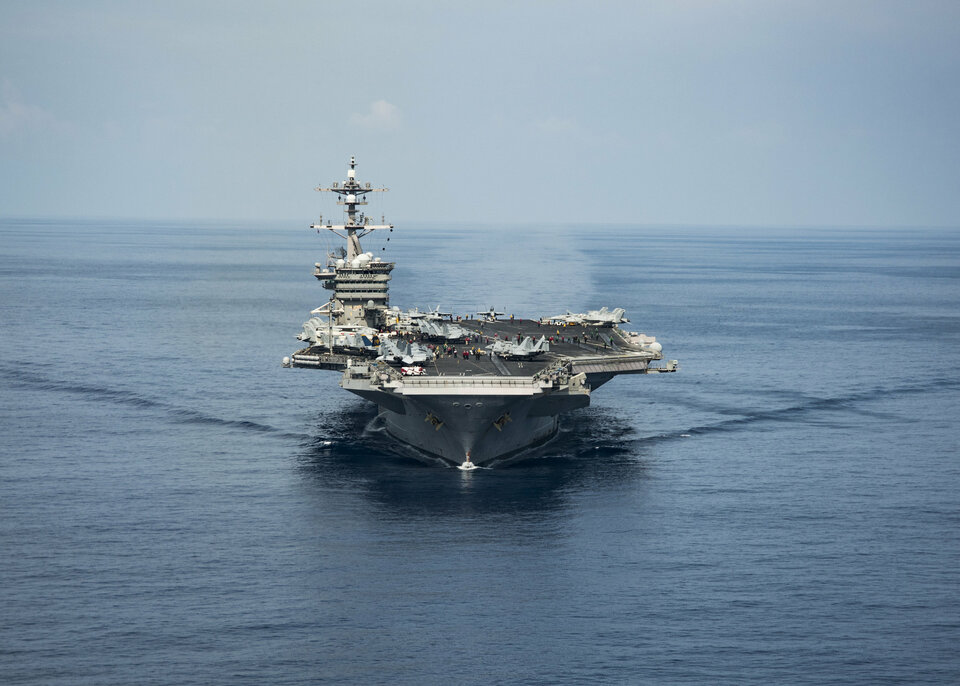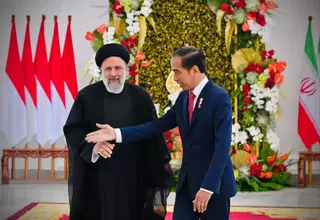Jamil Maidan Flores: Against Great Odds: Averting War in Asia Pacific

It’s easy to start a war. You fire a shot and kill somebody important, and all hell breaks loose between two governments; other governments soon take sides and before you know it you are in the middle of a world war. This was how World War I broke out.
Or else, in the South China Sea today, if a sailor on Vietnam’s newly launched warship had an itchy trigger finger and fired at a Chinese coast guard patrol boat barreling head-on, China’s military could overreact and send landing parties all over the Spratly Islands. Or fire missiles from newly built artificial islands. This would give the US Navy the perfect excuse to carry out a ferocious intervention. And before you know it a new Pacific war will have been inaugurated.
Or else, US President Donald Trump, vexed to madness at North Korea’s defiant firing of ballistic missiles, might order a preemptive strike against the hermit kingdom’s launching pads. Then China might see no choice but to step in with guns blazing to defend its wayward ally. And there would be hell to pay all over the region.
It requires no talent, and takes only a moment of mindlessness to ignite a war, which can inflict untold suffering and devastation on human life, usually for a long time, unless it is a nuclear war. In that case, it could be swift but it could also incinerate entire populations.
Peace is so much more complex as a state of affairs. One reason why peace is so precarious is that states organize themselves to be able to wage war, following the ancient adage, Si vis pacem, para belum, or "If you want peace, prepare for war." There is no country of any consequence today that does not have a military establishment.
The Dialectics of War
On top of that, the cycle of history and certain global situations seem to favor violent conflict between nations. For instance, the political scientist A.F.K. Organski said in 1958 that when the capability to make war is evenly distributed among states, war is more likely to happen. It is better therefore, for the sake of peace, that there be an unchallenged global hegemon. The United States once assumed that role, but today China and Russia are rising towards military parity, and that is not good news for peace lovers.
More recently, political economist Robert Gilpin said the international system might be regarded as in a state of equilibrium. If a development — like the rise of China as a world power — disrupted that equilibrium, then war would probably break out.
To prevent war, China should in general accept the present world order or else the rest of the world, especially the US, should find a way of accommodating China’s new role as an assertive global power. Or both sides could meet halfway. Otherwise missiles might start flying.
In a previous column I wrote about the notion of the Thucydides Trap as expounded by Harvard scholar Graham Allyson. According to this theory, an existing hegemon, such as the US, naturally fears a rising hegemon, such as China, and this is likely to lead to war. The theory, now the hottest topic in foreign policy circles, is named after the ancient Greek historian Thucydides who wrote that, "It was the rise of Athens and the fear that this instilled in Sparta that made war inevitable."
Yet not even Professor Graham Allyson believes that war between the United States and China is inevitable. Of the 16 historical cases of an existing hegemon and a rising hegemon that Allyson studied, war was averted in four of them through prudent statesmanship.
How War May Be Avoided
There is one piece of practical wisdom that can be derived from these theories on war between hegemons: the US and China must now pay close attention to managing their relations with confidence building and compromise, otherwise we would all see another bloodbath in the Asia-Pacific region. If they manage their relations with statesmanship, the current uneasy peace may become more durable.
That is easier said than done: For that to happen, China must, among other things, calibrate its preposterous claims to almost all of the South China Sea. But the Chinese Communist Party may not be able to survive the social backlash to such a pullback from its current maritime pugnacity.
On the other hand, the US today is led by a man-child who has no understanding of geopolitics, and who blames China for the problems of America. The US needs to have its president learn and learn fast the basics of statecraft and diplomacy to be able to devise a prudent way of dealing with China’s aggressive rise. It would help if there were some officials in the State Department tasked with studying and proposing Asia policy — there is none at the moment, as Trump refuses to make the necessary appointments.
Since these two hegemons are wont to keep on playing a zero-sum game with each other, other countries in the region should do something to allay the situation. Come to think of it, whether or not the US and China are making any effort to manage their relations constructively, it is the obligation of other regional countries to contribute what they can to the strengthening of peace.
In fact the other nations in the region share responsibility with the two major powers for the durability of regional peace. Durable peace must be earned by all stakeholders. Any strategy to promote it should be multifaceted, multilateral and should be carried out for the long term. That brings to mind the Association of Southeast Asian Nations (Asean) and its efforts at regional architecture-building for peace and development.
Asean’s Role
For decades, Asean as an organization has prided itself on its role as a force for peace in the region. Through such dialogue mechanisms as the Asean Regional Forum (ARF), the East Asia Summit (EAS) and the Asean Defense Ministers’ Meeting Plus (ADMM+), the organization is today contributing to the promotion of mutual confidence and conflict prevention among its members and dialogue partners, which include China and the United States.
Asean could contribute even more by simply concluding a legally binding code of conduct of parties in the South China Sea with China, as that would ensure against incidents at sea spinning of control. But that’s still a long way off, as China’s dilatory tactics, which have already stretched the negotiations to two more decades, is likely to prolong the process some more.
What could have been a game-changer was the Indonesia-sponsored proposal for a legally binding Indo-Pacific Treaty of Friendship and Cooperation, which was the focus of Asean regional architecture building some four years ago. Had this pact been concluded and come into force, it would have bound all Asean members and dialogue partners to a renunciation of war against a fellow signatory as a way of settling disputes. For some reason, however, Indonesia cooled down on this initiative, which then died a natural death.
It is all the more a pity that Asean today has been losing much of its centrality in regional affairs because members cannot unite among themselves when it matters most. Some of them are allies of the United States, while others, because of their strong economic ties with China, would not do or say anything that might displease the Middle Kingdom.
The Folly of Taking Sides
This is unfortunate because taking sides in the match-up between hegemons only intensifies the rivalry and mutual suspicion. Philippine President Rodrigo Duterte, who fancies himself an ally of China while badmouthing the United States, can learn something from the new president of South Korea, Moon Jae-in, who has managed early on to place himself equidistant to the two big powers, moving closer to China and seeking a modus vivendi with North Korea, while maintaining friendship and cooperation with the United States.
By taking China’s side, glorifying one and demonizing the other, Duterte has made war more attractive to China — however slightly. This attitude is worrisome and dangerous. The building of durable peace requires the elimination of incentives for war and the creation of alternatives more attractive than military confrontation in the attainment of political goals.
It also requires the building of international institutions, instruments and arrangements that promote a situation conducive to peace: in Asia Pacific these would include the long-delayed code of conduct, and a treaty of peace and cooperation that would bind Asean’s dialogue partners to a posture of non-aggression to one another. There has to be a common effort to build a culture of peace and conflict prevention in which think tanks and educational institutions, the media, religious leaders, business leaders and leaders of influential groups are deeply involved.
To be sure, a lot depends on the quality of the ruling establishments of the two hegemonic powers. They have to be secure in their hold on power and responsible enough not to be dependent on hard power to survive and attain their goals. And they must have the wisdom to compromise and thus craft a modus vivendi to ensure sustainable peace quickly enough before an incident in the South China Sea or in the Sea of Japan drives both of them into the morass of war.
But China is uncompromising in the South China Sea, while the US leader, infatuated with his own image, bumbles with incoherent tweets and has no coherent strategy to deal with China. That makes a recipe for war. So if the odds are so heavily against peace, why has war not broken out yet?
Sheer luck, maybe, that no triggering incident has occurred. And maybe because, although both sides do not at present have the wisdom to build durable peace, they do have a robust instinct for self-preservation. They know that in this day and age, considering the killing power of cutting-edge smart weapons, nobody wins wars any more. Hardly any ruling establishment, certainly neither that of China nor the United States, would relish a war it may not survive.
Jamil Maidan Flores is a Jakarta-based writer whose interests include philosophy and foreign policy. The views expressed here are his own. He may be contacted at jamilmaidanflores@gmail.com.
Tags: Keywords:POPULAR READS
President Jokowi Urges Global Restraint as Tensions Rise in the Middle East
President Joko "Jokowi" Widodo emphasized the importance of diplomatic efforts to prevent the escalation of conflict in the Middle EastKPK Identifies Sidoarjo Regent as Suspect in Corruption Probe
KPK has identified Ahmad Muhdlor Ali as a suspect in a corruption case involving the Sidoarjo Regional Tax Service AgencyEconomic Concerns Overshadow Security Worries for Indonesians in Iran
Indonesian citizens currently in Iran are more concerned about rising inflation than the security situation in the country.'Siksa Kubur' Review: Indonesian Horror with Solid First Act
The beginning part of "Siksa Kubur" is incredibly solid across many fields, including the visual storytelling.IDX Slides 2 Percent as Geopolitical Conflict Rattles Market Confidence
The IDX attributed the subdued performance of the index at the start of the week to the escalating geopolitical tensions in the Middle EastPopular Tag
Most Popular






















